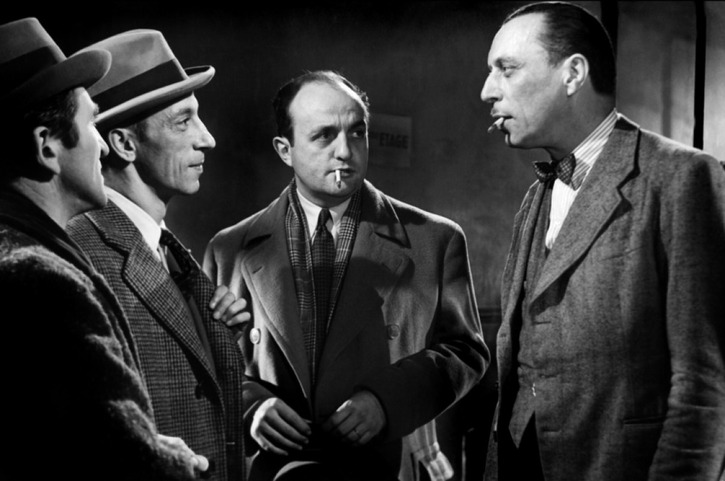France, 1947
Directed by Henri-Georges Clouzot
With Suzy Delair (Marguerite Chauffournier-Martineau, aka Jenny Lamour), Bernard Blier (Maurice Martineau), Simone Renant (Dora Monier), Louis Jouvet (Police Detective Antoine), Charles Dullin (Georges Brignon), Robert Dalban (the car robber)

Henri-Georges Clouzot claimed he did not want to shoot a detective story but a narrative based on criminal law and analysis. Yet his “Quai des Orfèvres” does describe a convoluted and intriguing police investigation which concludes with an unexpected twist – after all, film producer Georges Brignon was killed in another way than it had been so far suggested, and the whodunit gets a real guilty fellow. This is a really good and compelling detective story on its own terms, but its focus actually is wider than an investigation.
The narrative twist suggests in retrospect how little the crime matters and how important the characters’ minds are in the eyes of the director. The film’s thrust is underpinned by the pathological jealousy of the main character, Maurice Martineau: how it develops and drives him to try to kill someonem but it also shows how the character struggles against the urge to save his wedding and to avoid falling for a crime he did not commit.
The first part of the film sets the cogs and wheels of the detective drama. Jenny Lamour is a feisty and raunchy cabaret singer who wants to make it in the movie business and decides to strikes up a relationship with Brignon. But Maurice Martineau, her husband and piano accompanist, cannot accept it and his stubborn opposition leads to endless quarrels. He is not alone to frown upon Jenny’s new friendship. The couple’s best friend also advised Jenny against any intimacy with the leery and loathsome producer; she’s Dora Monier, a photographer oddly struck on Jenny.
Martineau’s jealousy and anger drive him one night to try and kill Brignon because he thinks his wife is with him but when he arrived at Brignon’s home what he finds is his dead body. At the same time, Jenny tells Dora she has killed by accident Brignon, in self-defense. Dora rushes to the producer’s house to get rid of any evidence against Jenny while Jenny tries to convince Maurice she has done nothing wrong with Brignon. When she comes back at her home, Dora listens to Maurice’s confessions. Now blood stains the links between husband and wife.
The second part of the film relates the investigation led by Police Detective Antoine, a former soldier in the French colonies, who brings up on his own a young son of mixed race and barely makes both ends meet. He is a garrulous, jaded, and slightly cynical man and a hard-boiled professional. He slowly uncovers the links between the Martineaus and Brignon but also stumbles upon Dora and a car robber. His investigation is going to be a really harsh and nearly destructive experience for the pianist’s couple and his person but it would eventually exculpate him.
The first part is the confident, step-by-step, description, of a man who puts himself under pressure and slowly thinks doing the unimaginable. A first incident with a songwriter at the beginning clearly hints at his awkward and testy nature and the rest of the story relentlessly tracks Maurice as he loses his countenance as he confronts the legitimate ambition of his wife (her ability to succeed is firmly demonstrated by the fluid montage illustrating the move from a simple rehearsal to a great stage performance and an ambitious photographic session). But this fall is not a simple mechanism and the film shows how difficult to hatch a murder plan is – and the fact that the pianist throws himself into action only to find a dead is a stinging irony.
The second part is an increasingly dark and stifling examination of the police work and the consequences on the Martineaus. The two have painted themselves into a corner but they find their comeuppance with police methods and prejudices that are abrupt and wicked. They drive Martineau to commit suicide but they also enable to find the real killer. Antoine may seem heartless and manipulative, yet he pronounces remarkably sensible judgments on some people (he guesses the real nature of Dora’s admiration for Jenny and speaks about it rather frankly and without light-hearted irony, a feat given the period the film was shot) and shows a human face easy to relate to, thanks to his worried attention to his son. Tension rises throughout the investigation, creating a tragic atmosphere but also bringing truly poignant moments that illustrate both the genuine love between the Martineaus and the desperate situation their behaviors have led them into.
A solid camerawork often magnifies the performance of the actors as they convey the strong feelings that stir their characters; these performances also highlight the peculiar quality of the dialogues, shaped by a jovial and colloquial tone that can suddenly breaks into a brutal exchange, letting an abrasive remark or a searing comment out. This is a strange mix of exuberance and causticity that pays tribute to a Parisian and popular language hard to translate and in part belonging to the past. The clever use of light and shades also emphasizes in a concrete and inspired way the angst and predicaments of the characters, in a city and places where mundane attitudes can segue into sordid ones under the pressure of one’s torment and temptation (in fact, a walk on the evil side of people is what most Clouzot films easily come down to).

